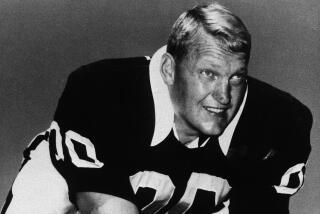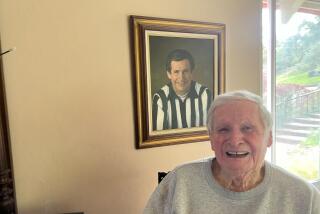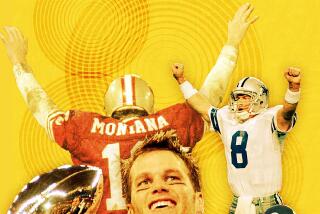Pulling for the players
- Share via
Back in his playing days, guard Gene Upshaw used to prepare for games by turning his fists into clubs. He used a whole roll of tape on each hand, so much of the gummy stuff that his fellow Oakland Raiders called him “The Mummy.”
Now we know that Upshaw really did have hands under there.
Hands that helped mold the NFL, shape the relationships between players and owners, and forge the type of labor peace that’s the envy of every other professional sports league.
So when Upshaw, head of the NFL Players Assn., died Wednesday night, only three days after being diagnosed with pancreatic cancer, he left a void that might never be filled.
I spoke to several old Raiders on Thursday -- Howie Long, Matt Millen, Tim Brown, Mike Haynes, onetime personnel man Mike Ornstein -- and each expressed the same thing: utter shock that this giant, a man who protected the game and active players the way he once protected quarterbacks, is gone.
Upshaw lost a lot of weight a few years ago, and he did a good job of keeping it off. This spring, with his broad shoulders and narrow waist, he looked more like a triathlete than a pulling guard. Recently, though, the pounds kept coming off.
Last month, Brown saw him at the celebrity pro-am golf tournament in Lake Tahoe and couldn’t believe how thin he looked. Upshaw said his back had been bothering him, but other than that he felt fine.
Even last week, there was no hint he was ill.
“I talked to him on the phone last Friday and he didn’t tell me he was sick or anything,” Ornstein said. “I don’t think he even knew he was sick.”
For decades, Upshaw was defined by his strength -- strength on the field, and the strength of his convictions as a union leader. He was a controversial figure, most recently drawing the ire of retired players fighting for better benefits, but he didn’t sway from what he thought was right.
“He was a fantastic leader who didn’t back down to anybody -- players, owners or reporters,” Haynes said. “I saw him in discussions with owners where he was super-tough and didn’t back down. As a player, you had to respect that.”
Brown said he felt secure whenever Upshaw was in the room, knowing that the big man always had his best interests at heart.
“I remember the first player-rep meeting I went to in 1990,” Brown said. “I was as green as I could possibly be in terms of the union and union matters. After listening to him speak for 45 minutes, I knew I was in good hands.”
In a statement Thursday, the Raiders said Upshaw’s “career successes as a professional football player and a union leader are unparalleled.” That’s not typical Raiders hyperbole. That’s true.
Noting how players’ salaries have skyrocketed over the last two decades or so, longtime agent Leigh Steinberg said Upshaw “had the clarity of vision to understand that the true best interests of players was not in strikes and picket lines, but in partnership with the board rooms of wealthy owners.”
A constant refrain of Upshaw’s critics was that he was too close to the league’s top brass to make hard-line decisions on behalf of the players.
When Roger Goodell took over as commissioner in 2006, broadcaster Bryant Gumbel famously called the union head outgoing commissioner Paul Tagliabue’s “personal pet” and suggested Goodell ask Tagliabue “where he keeps Gene Upshaw’s leash.”
But in the job Upshaw had, there’s no pleasing everyone. Clearly, NFL owners thought they had given up too much to players in the latest collective bargaining agreement. Why else would they have voted unanimously in May to opt out of that agreement?
I was at that meeting in Atlanta, and -- along with four other reporters -- had lunch with Upshaw afterward in the hotel across the street. He urged us not to “drink the owners’ Kool-Aid,” and spent more than two hours presenting his case for the players. No one could have described him as a league lap dog that day.
Upshaw was one of those incredibly rare people who have risen to the top of two distinctly different careers. He wasn’t a Harvard-educated lawyer. He grew up poor in Robstown, Texas, and graduated from Texas A&I;, which is now Texas A&M; Kingsville. He would become the only player in NFL history to play in three Super Bowls for the same team in three decades.
He was also a fixture on perhaps the greatest offensive line in history, one that included Hall of Fame tackle Art Shell, center Jim Otto and tight end Dave Casper.
When NFL Films wanted to isolate a camera on an offensive lineman in a championship game -- something it had never done -- it chose Upshaw in Super Bowl II.
A few weeks earlier, in Oakland’s regular-season finale against Buffalo, Upshaw became the first offensive lineman NFL Films ever wired with a microphone during a game. That’s when he made an unforgettable reference to his jersey number -- a suggestion to run to his side of the field.
“Take it down Highway 63,” he urged.
No one could have guessed the turns that road would take, how far it would go, or where it might end.
--
--
(BEGIN TEXT OF INFOBOX)
Upshaw file
Gene Upshaw’s playing career highlights and awards. He played his entire career with the Oakland Raiders (1967-81):
Seven-time Pro Bowl selection (1968, 1972,
1973, 1974, 1975, 1976, 1977).
Eleven-time All-Pro selection (1967, 1968,
1969, 1970, 1971, 1972, 1973, 1974,
1975, 1976, 1977).
Two-time Super Bowl champion (XI, XV).
NFL 75th Anniversary All-Time Team.
NFL 1970s All-Decade Team.
--
Source: nfl.com
More to Read
Go beyond the scoreboard
Get the latest on L.A.'s teams in the daily Sports Report newsletter.
You may occasionally receive promotional content from the Los Angeles Times.











